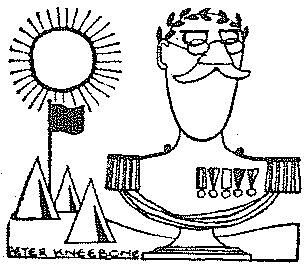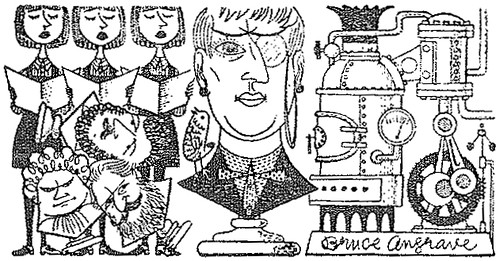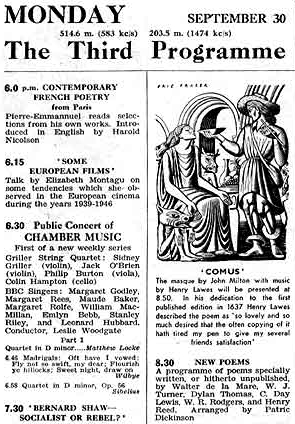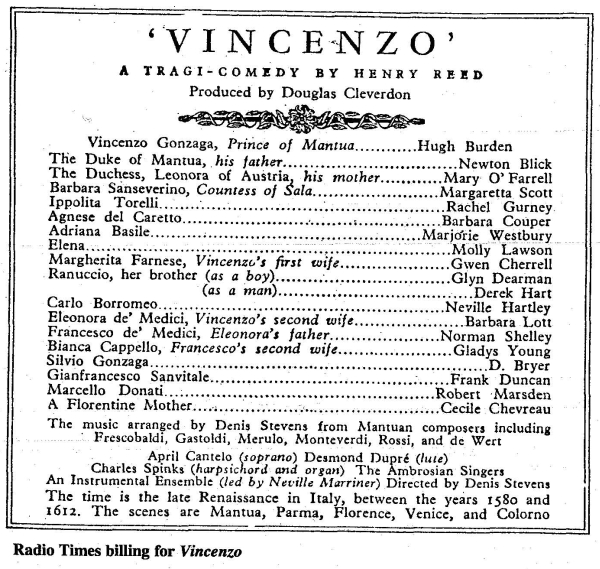|
|
Documenting the quest to track down everything written by
(and written about) the poet, translator, critic, and radio
dramatist, Henry Reed.
An obsessive, armchair attempt to assemble a comprehensive
bibliography, not just for the work of a poet, but for his
entire life.
Read " Naming of Parts."
|
Contact:
|
|
|
|
Reeding:
|
 |
I Capture the Castle: A girl and her family struggle to make ends meet in an old English castle.
|
 |
Dusty Answer: Young, privileged, earnest Judith falls in love with the family next door.
|
 |
The Heat of the Day: In wartime London, a woman finds herself caught between two men.
|
|
|
|
Elsewhere:
|
|
All posts for "RadioTimes"
|
|
|
21.12.2024
|
In the early months of 1958, the BBC Third Programme repeated the entirety of Henry Reed's sequence of Hilda Tablet plays—beginning with a 1953 recording of A Very Great Man Indeed—in anticipation of Reed's latest (and advertised as the last, but ultimately the penultimate) entry, The Primal Scene, As It Were.
Reed wrote a short re-introduction for the Radio Times on February 7, 1958, to give thanks and credit to the actors and musicians who brought the characters to life in his most famous and most listened-to of radio plays. He has special mention for Hugh Burden, Mary O'Farrell, the music of Donald Swann, Carleton Hobbs, and Deryck Guyler.
The Primal Scene takes place in the Mediterranean, and if I remember correctly, is the result of BBC paying for Reed's holiday to Athens and Greece, in order to research an historical play set in ancient Mycenae.
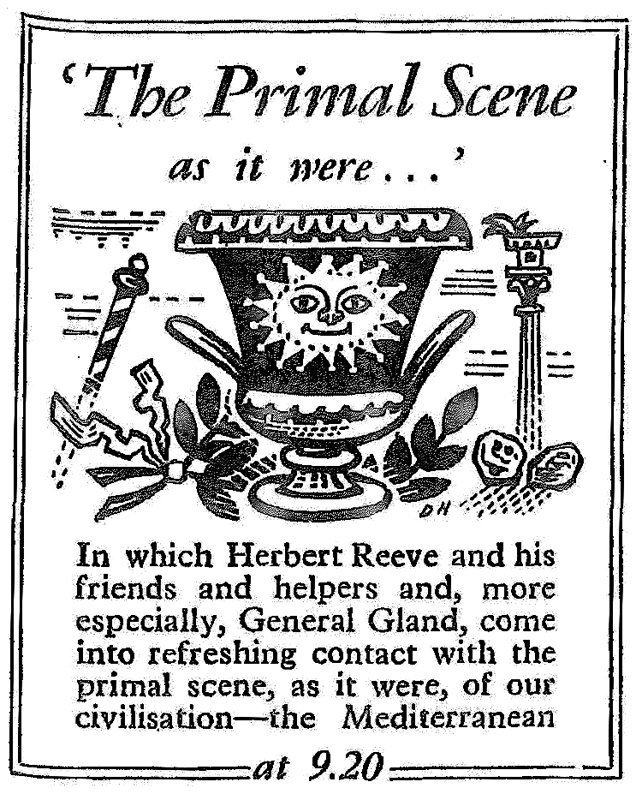 Without the Actors . . .
Beginning on Thursday with 'A Very Great Man Indeed,' the Third Programme is to revive all the Henry Reed satires. The author contributes this preface
I HAVE been told that there was once a Derby winner who was heard, in a moment of morbid self-questioning, to observe: 'Without the horse, I doubt if I could have done it.' I am not given to this kind of introspection myself and among the actors who appear in the Herbert Reeve scripts, there is none that resembles, in any respect, a horse. But I am bound to confess that the tormented jockey's remark always comes to my mind whenever people say that they have enjoyed these programmes, since, apart from the first script, A Very Great Man Indeed, they all derive directly from the performances of the actors.
I think all of us concerned with that early piece enjoyed doing it. But for some time after, I was myself so much haunted by the realistic and touching intensity with which Hugh Burden and Mary O'Farrell had enacted the scene at Hilda's piano that I found myself wistfully craving to know exactly what happened afterwards. This, and nothing else, led to The Private Life of Hilda Tablet. (The word 'composeress' has been objected to in connection with Hilda; but it seems an innocent enough counterpart to the word 'paintress.')
Hilda's music had been potently realised by Donald Swann. It was Mr. Swann's devotion to Hilda, his voluminous invention on her behalf, and a certain gleam that always appeared in his eyes whenever she was mentioned, that led to the programme about her opera, Emily Butter. It was by this time felt that more might profitably be said by Carleton Hobbs on the subject of Stephen Shewin. It was said in A Hedge, Backwards, which was billed as the last of the series, We had not however counted on Deryck Guyler's General Gland, who seemed to call for profounder acquaintance. This has led to a new programme The Primal Scene, as it Were . . . , which will be broadcast next month. I think I may safely promise that this will be the end of Herbert Reeve, The title is a quotation from the piece itself, and refers to the Mediterranean.
|
1541. Trewin, J.C., "Old Master." Listener 53, no. 1368 (19 May 1955), 905-906.
Trewin's review of Henry Reed's radio drama, Vincenzo.
|
This week marks the 70th anniversary of the BBC's Third Programme, which broadcast from September 29, 1946 until April, 1970, when it was replaced by BBC Radio 3. Too short a season.
Radio 3 is running 70 days of celebrations to mark the anniversary, including " Three Score and Ten," 50 episodes of poets reading from their work and others, a play(!) dramatizing the start of the Programme, " The Present Experiment," as well as rebroadcasts of Humphrey Carpenter's 1996 history, " The Envy of the World." Henry Reed's Hilda Tablet plays are mentioned in episode two of Carpenter's documentary, " Rudely Truncated."
Andy Walmsley is doing a much better job of covering the anniversary over at Random Radio Jottings. For my part, I thought I would bring out this summation of Henry Reed's early contributions to the Third Programme by Douglas Cleverdon, published in the Radio Times on April 1, 1955: "A Henry Reed Season," billing a series of repeat Reed programmes from the first half of the 1950s:
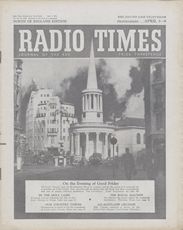
A Henry Reed Season
Any young author who aspires to write for radio cannot do better than study the various programmes Henry Reed has written.'
DOUGLAS CLEVERDON, who has produced many of them, introduces the series of revivals beginning in the Third Programme this week
MILLIONS of regular fans look forward to Take It From Here, The Archers, The Goon Show; a very much smaller number of listeners tune in with an even more fervent devotion to any programme written by Henry Reed. For Henry Reed is that rarest of birds, the creative writer who finds in radio his most fruitful medium of expression.
His reputation as a poet was founded on a single volume published nearly ten years ago—A Map of Verona. His only other book is his broadcast version of Moby Dick. His contributions to radio, however, consist of about thirty scripts and seventy talks. Such talks as Towards 'The Cocktail Party' have revealed his critical insight: and the incisive comments he was accustomed to make as a member of 'The Critics' proved his fearlessness in judgment.
But it is principally through the scripts written for the BBC Features Department that he has secured his increasingly appreciative audience. His first work, broadcast from the Midland studios, was a jeu d'esprit on Noises. Then, in January 1947, came his first major work for broadcasting, a radio play based on Herman Melville's Moby Dick, with linking narration in verse a recording of the second production (with Sir Ralph Richardson as Captain Ahab) will be broadcast on April 29. Pytheas (May 1947) was followed in 1949 by The Unblest and The Monument, two dramatic studies in verse of the Italian poet Leopardi, a recording of the 1950 production of The Unblest will be broadcast on April 15.
The Inspiration of Italy
The love of Italy seems to be a permanent element in the English literary tradition; and in Return to Naples (to be re-broadcast on April 5), Henry Reed nostalgically recalled a series of visits to a family in Naples before and after the war. For this autobiographical piece he evolved a simple but elegant variation of the usual radio narration, causing the narrator to address not the listener, but the author himself. A By-Election in the 'Nineties (1951: to be repeated on April 11) was a purely comic documentary, based on contemporary newspaper reports of a Dorset by-election.
Then followed two more programmes on Italian themes: The Streets of Pompeii, which was awarded the Radio Italiana prize for 1953 (a new production will be broadcast on April 22); and The Great Desire I Had, based upon the fancy that towards the end of the sixteenth century Shakespeare visited Italy and fell in with the players of the Commedia dell' Arte.
Then followed the group of satirical comedies, A Very Great Man Indeed, The Private Life of Hilda Tablet, and Emily Butter, with their highly sophisticated wit and exuberant characterisations. As all three have been broadcast fairly recently, none will be repeated during the coming weeks; but many listeners hope that they will form part of the Third Programme's regular repertoire. Henry Reed's latest work, Vincenzo, was broadcast last week as a precursor to the present series of repeats. I wish I knew where that quote from Douglas Cleverdon used as the epigraph comes from.
|
1540. Trewin. J.C., "Keeping It Up." Listener 52, no. 1342 (18 November 1954), 877. 879.
Trewin's review of Henry Reed's operatic parody, Emily Butter.
|
Owing to some lovely winter weather this morning, I've got a brief reprieve from work: a half-day snow day. It seems unlikely that the journal volumes which I requested from library storage last week will show up today, so instead I'll post two items I've been sitting on for some time: illustrations for billings of Reed's radio plays from the Radio Times:
This illustration is by Peter Kneebone, and is from the Radio Times for May 1, 1959. It accompanied the billing for the sixth play in Reed's Hilda Tablet series: Not a Drum Was Heard: The War Memoirs of General Gland, first broadcast on the BBC Third Programme on May 6, 1959. The General looks distinguished, but he's quite mad.
This drawing is by Bruce Angrave, from the Radio Times for October 23, 1959, illustrating the seventh and final play in Reed's sequence, Musique Discrète: A Request Programme of Music by Dame Hilda Tablet. The play premiered on October 27, 1959, with musique concrète renforcée provided by Donald Swann. Isn't Hilda's monocle a gas?
(I'm not embarrassed to admit that I could only recognize Beethoven's bust [bottom left] getting tumbled in Angrave's picture. Our friend the Webrarian came to my rescue: that's Wagner turned sideways, with Brahms just below.)
|
1539. Trewin, J.C. "Dead and Alive." Listener 50, no. 1281 (17 Sepetember 1953): 479-480.
Trewin's review of the BBC Third Programme premiere of Reed's play, A Very Great Man Indeed.
|
In September of 2006, the BBC launched a website to commemorate the 60th anniversary of the launch of the Third Programme (later, Radio 3), with specially-written articles, memories by staff and performers, letters from listeners (both "satisfied" and "disgusted"), and held celebratory broadcasts.
I remember being very excited when I found that the BBC had reproduced the September 27, 1946 issue of the Radio Times, which provided an introduction to the Third, its intentions, and programming.
If I had bothered, back in 2006, to look a little more closely, I would have noticed that Henry Reed was scheduled to take part in a reading of new poems by Walter de la Mare, W.J. Turner, Dylan Thomas, C. Day Lewis, and W.R. Rodgers, on September 30, 1946:
The "New Poems" program was arranged by the poet and translator Patric Dickinson, who worked for the BBC from 1942 to 1948. I'm not sure, but I believe Reed may have read his poem "The Forest," which was printed in the Listener on October 17, 1946, titled simply, "Sonnet." W.J. Turner, I'm sorry to say, died shortly after the broadcast, on November 18, 1946.
The entire 28-page issue of Radio Times is available from the BBC as a PDF document.
|
1538. Walker, Roy. "Betti and the Beast." Listener 58, no. 1492 (31 October 1957): 713-714.
Review of Henry Reed's translation of Ugo Betti's Irene, broadcast on the Third Programme on October 20, 1957.
|
From Denis Stevens' Monteverdi in Venice (Fairleigh Dickinson University Press, 2001), a facsimile of the billing in Radio Times (of May 27, 1955?) for Reed's radio play, Vincenzo (click to view full size):
Vincenzo, previously.
|
1537. Radio Times, "Full Frontal Pioneer," Radio Times People, 20 April 1972, 5.
A brief article before a new production of Reed's translation of Montherlant, mentioning a possible second collection of poems.
|
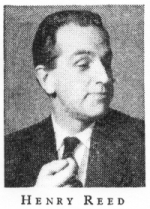
Photograph of Henry Reed, Radio Times 145,
no. 1876 (23 October 1959): 6.
|
1536. L.E. Sissman, "Late Empire." Halcyon 1, no. 2 (Spring 1948), 54.
Sissman reviews William Jay Smith, Karl Shapiro, Richard Eberhart, Thomas Merton, Henry Reed, and Stephen Spender.
|
|
|
|
1st lesson:
Reed, Henry
(1914-1986). Born: Birmingham, England, 22 February 1914; died: London, 8
December 1986.
Education: MA, University of Birmingham, 1936. Served: RAOC, 1941-42; Foreign Office, Bletchley Park, 1942-1945.
Freelance writer: BBC Features Department, 1945-1980.
Author of:
A Map of Verona: Poems (1946)
The Novel Since 1939 (1946)
Moby Dick: A Play for Radio from Herman Melville's Novel (1947)
Lessons of the War (1970)
Hilda Tablet and Others: Four Pieces for Radio (1971)
The Streets of Pompeii and Other Plays for Radio (1971)
Collected Poems (1991, 2007)
The Auction Sale (2006)
|
Search:
|
|
|
Recent tags:
|
Posts of note:
|
Archives:
|
Marginalia:
|
|









